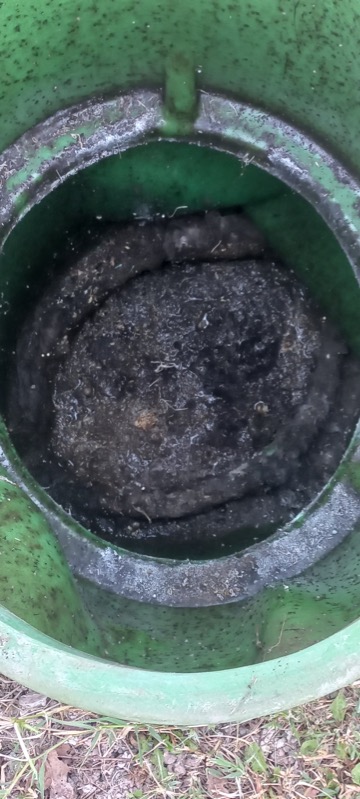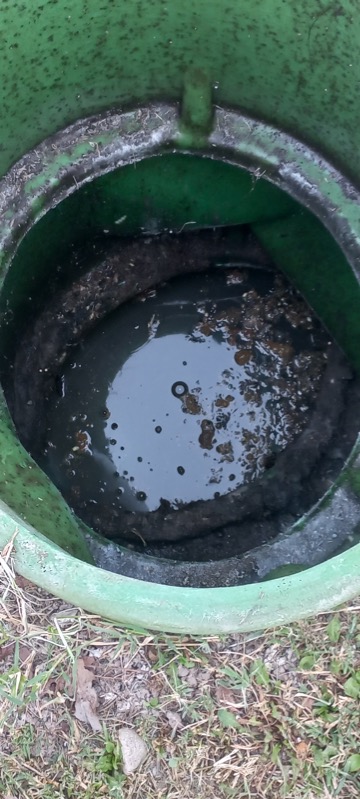- Sanitation systems
- Faecal sludge management (FSM)
- Faecal sludge treatment technologies
- Is there an enzyme or bacteria that can be manufactured or used to digest sludge?
Is there an enzyme or bacteria that can be manufactured or used to digest sludge?
10.6k views
Re: Is there an enzyme or bacteria that can be manufactured or used to digest sludge?
Please see example photos below showing the effect of Bacillus treatment of a very soiled septic tank. Results were achieved in 2 weeks.
Kevin
Avantu Water Inc.
Vancouver, Canada
Attachments:
-
 20220929_S...fore.jpg
(Filesize: 98KB)
20220929_S...fore.jpg
(Filesize: 98KB)
Please Log in to join the conversation.
You need to login to replyRe: Is there an enzyme or bacteria that can be manufactured or used to digest sludge?
This is simply not true. We are working with Bacillus/enzyme blends that effectively digest/liquify sludge in a large variety of applications ranging from industrial farming, sewage treatment works, septic tanks, and pit toilets. We have applications showing in industrial farming application, sludge results lowered by 70% in a matter of 1 to 2 months.I concur with what Elisabeth says: there are no enzymes that actually "digest" sludge. And many marketers will try to tell you otherwise.
But I would add that there are specific bacteria that can colonize that do have better abilities to convert sludge solids into gas; although hard to establish thermophilic bacteria can reduce your sludge volumes -- they need high temperatures (obviously) and lots of time exposed to fresh sludge; mesophilic bacteria may be more robust and easier to establish, but don't reduce sludge to the same levels as their thermophilic peers. Again, establishing these efficient colonies and keeping them thriving is a challenge
Not to mention extreme improvements to DO, reduction in COD, reduction in coliform, and also importantly, drastic reduction in odours.
I am open to talking to anyone about this.
Kind regards
Kevin
Avantu Water Inc.
Vancouver, Canada
Please Log in to join the conversation.
You need to login to replyRe: Is there an enzyme or bacteria that can be manufactured or used to digest sludge?
We never documented it apart from the test, and I add some photos that I hope are self explantory
Attachments:
Please Log in to join the conversation.
You need to login to reply- Elisabeth
-
- Moderator
- Freelance consultant since 2012 (former roles: program manager at GIZ and SuSanA secretariat, lecturer, process engineer for wastewater treatment plants)
Less- Posts: 3372
- Karma: 54
- Likes received: 931
Re: Is there an enzyme or bacteria that can be manufactured or used to digest sludge?
That's correct. Suppliers will try to tell you otherwise but most likely they would be selling you "snake oil", i.e. nothing useful, just expensive. Please read in the posts about in this thread above for more information.
Regards,
Elisabeth
Freelance consultant on environmental and climate projects
Please Log in to join the conversation.
You need to login to reply- Dantugli
-
- Founder and CEO at Alpha Ecotech LTD.
Less- Posts: 3
- Likes received: 1
Re: Is there an enzyme or bacteria that can be manufactured or used to digest sludge?
Please Log in to join the conversation.
You need to login to reply- VikkiBolam
-
Less
- Posts: 1
- Likes received: 1
Re: Is there an enzyme or bacteria that can be manufactured or used to digest sludge?
I remember an observation from a report that part of the problem could be enzymes are made for different settings (such as swine farms) and so don't cross over well to the pit environment. If research was carried out on understanding the pit environment in much more depth, and an enzyme engineered to work in that environment, there is the possibility that it could be more successful.
As a word of warning, we tested the best-selling Ugandan additive as well as a control against the new additive.
We were told that the best-selling additive could eat everything in the pits, including plastic garbage (even though it was sold in a plastic container!!). Supposedly it was sourced from Germany. It appeared to be little more than paraffin. Worse, there was growing concern from users that it was causing some pits to collapse.
Good luck finding an alternative solution.
Please Log in to join the conversation.
You need to login to reply- JillHass
-
- Water & sanitation expert, with 30+ years experience in construction design & implementation management, and specialized in emergency response due to climate change or conflict/violent settings. Previously CTO for technology firm (patents, product development & commercialization); Consulting Engineer in asset management of municipal infrastructure
Less- Posts: 5
- Likes received: 3
Re: Is there an enzyme or bacteria that can be manufactured or used to digest sludge?
I concur with what Elisabeth says: there are no enzymes that actually "digest" sludge. And many marketers will try to tell you otherwise.
But I would add that there are specific bacteria that can colonize that do have better abilities to convert sludge solids into gas; although hard to establish thermophilic bacteria can reduce your sludge volumes -- they need high temperatures (obviously) and lots of time exposed to fresh sludge; mesophilic bacteria may be more robust and easier to establish, but don't reduce sludge to the same levels as their thermophilic peers. Again, establishing these efficient colonies and keeping them thriving is a challenge.
Good luck
Jill
Relief International
E: This email address is being protected from spambots. You need JavaScript enabled to view it.
M: +1 (647) 268-4620
S: j.l.hass
Please Log in to join the conversation.
You need to login to replyRe: Is there an enzyme or bacteria that can be manufactured or used to digest sludge?
I have just posted my response in the older existing thread about this topic, see here:
forum.susana.org/280-faecal-sludge-treat...es-em?start=36#29035
Regards
Pawan
Chairman
Foundation for Environment and Sanitation
Mahavir Enclave
New Delhi 110045, India
Web: www.foundation4es.org
Linked: linkedin.com/in/drpkjha
Please Log in to join the conversation.
You need to login to reply- Elisabeth
-
- Moderator
- Freelance consultant since 2012 (former roles: program manager at GIZ and SuSanA secretariat, lecturer, process engineer for wastewater treatment plants)
Less- Posts: 3372
- Karma: 54
- Likes received: 931
Re: Is there an enzyme or bacteria that can be manufactured or used to digest sludge?
I recommend for you to read this previous thread:
forum.susana.org/280-faecal-sludge-treat...l-sludge-includes-em
(45,000 views by the way! not bad)
And also this Wikipedia article:
en.wikipedia.org/wiki/Pit_additive
To solve your problem you'll have to either look into safe pit emptying and treatment and disposal of faecal sludge, or maybe conversion to toilets that don't produce sludge, like urine diversion dehydration toilets (UDDTs), see here on the forum:
forum.susana.org/34-urine-diversion-syst...-and-ud-flush-toilet
Regards,
Elisabeth
Freelance consultant on environmental and climate projects
Please Log in to join the conversation.
You need to login to reply- Tsepo
-
Topic AuthorLess
- Posts: 6
- Likes received: 1
Is there an enzyme or bacteria that can be manufactured or used to digest sludge?
I am based in Lesotho Southern Africa, I would like to know whether there is An enzyme or bacteria that can be manufactured or used to digest the sludge So that it slows the filling up of school pit latrines.
We currently have a problem of land as pit latrines fill up fast and new space or land unavailable
Your assistance highly appreciated
kIND REGARDS TSEPO MACHELA
Sent from Mail for Windows 10
Please Log in to join the conversation.
You need to login to reply- Sanitation systems
- Faecal sludge management (FSM)
- Faecal sludge treatment technologies
- Is there an enzyme or bacteria that can be manufactured or used to digest sludge?













